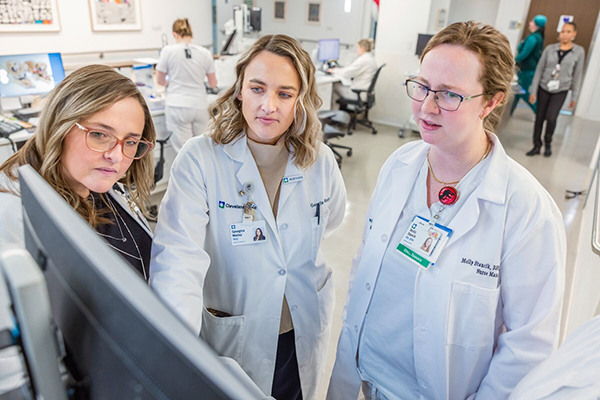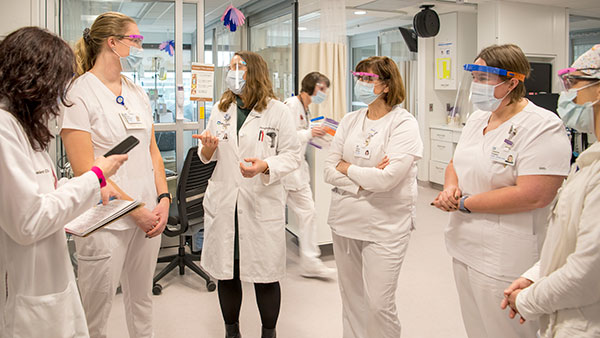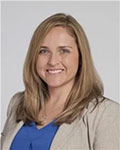Overview

Established in 2020, the Nursing Ethics Program (NursE) is a collaborative program between the Nursing Institute and the Center for Bioethics led by Georgina Morley, PhD, RN, Cristie Cole Horsburgh, JD and Dianna Copley, DNP, APRN-CNS. Nursing Ethics Program Faculty guide development and operationalization of this innovative and emerging program.
This Nursing Ethics Program aims to:
- Create and sustain a network of nurses with specialist interest in ethics
- Help nurses thrive through the provision of ethics education
- Build nursing ethics scholarship and research; and
- Create safe moral spaces for caregivers to receive moral distress support
Sign up for Moral Distress Reflective Debrief Facilitator Training in 2026.
Education Opportunities

Nursing Ethics Fellowship
A two-year, full-time training program dedicated to developing leaders in nursing ethics through scholarship and clinical ethics practice. It is our belief that a robust nursing ethics training program prepares nurses to conduct clinical ethics consultation independently, contribute to nursing ethics scholarship and research, and lead a nursing ethics program.
Fellows in this program will have the opportunity to:
- Develop expertise in clinical ethics consultation
- Conduct empirical research or a nursing ethics project
- Develop leadership and programming skills
Our high-volume clinical service (>750 consultations per year) and structured curriculum ensures that professionals who complete the fellowship are prepared for a sustainable career in clinical ethics.
Learn more about our Nursing Ethics Fellowship
Nursing Ethics Faculty Fellowship
A 12- or 18-month professional development program open only to current Cleveland Clinic nurses with a Masters or Terminal Degree. The Nursing Ethics Faculty Fellowship is a project-based, longitudinal experience focused on developing excellence and leadership in examining and addressing ethical issues through the lens of nursing practice. The Nursing Ethics Faculty Fellow will be expected to design and conduct a nursing ethics project during the fellowship year that examines an area of nursing ethics and enhances the delivery of care in clinical practice. The Faculty Fellow will receive direct mentorship from Georgina Morley, PhD Director of the Nursing Ethics Program, Cristie Cole Horsburgh, JD Associate Director, and will receive additional nursing research mentorship from the Office of Nursing Research and Innovation.
Learn more about our Faculty Fellowship
Nursing Ethics Summer Internship
An 8- 10 week internship opportunity open to students currently enrolled in an accredited nursing school program (associate degree/BSN/MN) or a registered nurse studying for a terminal degree (PhD/DNP/JD). Priority will be given to students who can demonstrate previous ethics scholarship experience, familiarity with bioethics scholarship, and/or empirical research methods.
The summer intern will contribute to projects examining ethical issues through the lens of nursing practice and research in nursing ethics. Responsibilities include contributing to research activities, quality improvement projects and assisting in the preparation of research reports, publications and presentations. Opportunities will be provided for shadowing clinical activities such as Nursing Ethics Huddles, Ethics Rounding and Clinical Ethics Consultation.
Faculty
Leadership

Georgina Morley, PhD, MSc, RN (UK) Director
Georgina is a Nurse Ethicist within the Center for Bioethics and works closely with the Nursing Institute and the Heart, Vascular and Thoracic Institute (HVTI).
Morley received a Bachelor of Arts in Philosophy from King’s College London and went on to train as a nurse, receiving a post graduate diploma in Adult Nursing in 2012 and a Master of Science in Nursing from King’s College London in 2014. She completed her doctoral studies at the University of Bristol Centre for Ethics in Medicine, exploring moral distress as experienced by critical care nurses in the United Kingdom.
Recognized as an international expert on moral distress, Morley has been invited to speak on the topic in the United Kingdom and United States, and she has published peer-reviewed papers and book chapters.

Cristie Cole-Horsburgh, JD Associate Co-Director
Cristie is a Regional Staff Ethicist in the Center for Bioethics. After completing the Cleveland Fellowship in Advanced Bioethics, she joined the professional staff in the Center of Bioethics at the Cleveland Clinic in 2014.
Cole-Horsburgh aims to address ethics needs at the local and enterprise level. This comprises clinical ethics consultation, training in ethics consultation, education of healthcare professionals, institutional policy development and innovative ethics programming, including preventive ethics initiatives.
Most recently, she focuses on developing responses to moral distress experienced by healthcare professionals and broadening impact of ethics programming by increasing opportunities to engage in ethics activities and tying such engagement to professional development.
She received her Juris Doctorate from the University of Arizona’s James E. Rogers College of Law in 2008 and a Bachelor of Arts in Biology and Society with a concentration in Law and Society from Cornell University in 2003.

Dianna Copley, DNP, APRN-CNS, ACCNS-AG, CCRN, Associate Director
copleyd@ccf.org
Dianna is a Clinical Nurse Specialist at Cleveland Clinic. Copley began her career at Cleveland Clinic in the Surgical Intensive Care unit in 2009 after receiving initial training as a nurse at Lorain County Community College (2008) also earning an associate of arts and associates of science (2009). Copley received her Bachelor of Science in Nursing at the University of Akron (2010) and her Master of Science in Nursing as an Adult-Gerontology Clinical Nurse Specialist at Kent State University (2015). In 2020, Copley completed her Doctor of Nursing Practice from Case Western Reserve University’s France Payne Bolton School of Nursing. She studied Second Victim Phenomenon and now serves as her healthcare system’s nursing lead for their SVP peer support program, Emerge Stronger.
Copley served as the inaugural Nursing Ethics Faculty Fellowship within the Center for bioethics from 2021-2023. She is passionate about professional development, clinical nurses’ involvement in quality improvement, and supporting nursing practice through preventative ethics initiatives, including rounding.
Additional Faculty
Nancy Albert, PhD, CCNS, CHFN, CCRN, NE-BC, FAHA, FCCM, FHFSA, FAAN
Associate Chief Nursing Officer, Nursing Research and Innovation
Esther Bernhofer, PhD, MA, RN, PMGT-BC
Associate Professor , Frances Payne Bolton School of Nursing, Case Western Reserve University
Rosemary Field, MS, APRN, AOCNS
Clinical Nurse Specialist, Marymount Hospital
Julie Gorecki, MBA, BSN, RN, NEA-BC
Associate Chief Nursing Officer, Akron General
Myra King, CNS, DNP, APRN, ACNS-BC, CCRN-CSC
APRN/PA Coordinator, Clinical Nurse Specialist, Main Campus
Natalie Weigand, MSN, APRN.CNP, FNP
Female Pelvic Medicine & Reconstructive Surgery Transgender Surgery Program
Completed Faculty Fellowship (2022-2024)
Jennifer Katlen, Med, MSN, APRN-CNS, ACNS-BC, CCRN, GERO-BC
Clinical Nurse Specialist, South Pointe Hospital
Completed Faculty Fellowship (2023-2025)
Maggie Procunier BSN, MSN, MHA/Ed., HEC-C
Nursing Operations Manager
Completed Faculty Fellowship (2023-2025)
Molly Stancik, BSN, RN, PCCN
Nurse Manager, J61 & J63 Cardiovascular Surgery Stepdown, Main Campus
Completed Moral Spaces (2022-2023)
Faculty Fellow
2024-2026
Julie Gorecki MBA, BSN, RN, NEA-BC
Chief Nursing Officer, Fairview Hospital
Research & Scholarly Work
Moral Distress Research
Helping caregivers overcome moral distress
Moral distress is the psychological distress experienced in relation to an ethically challenging situation or event. Although it was first observed within nursing, caregivers across all disciplines — including physicians, respiratory therapists, social workers and chaplains — experience moral distress.
Signs and symptoms of moral distress might be feelings of frustration, anger, powerlessness or questioning whether you are doing the right thing concerning patient care.
If left unaddressed, moral distress can cause caregivers to withdraw from patient care, consider leaving their place of work or their profession altogether. Learn more about moral distress from our COVID-19 curbside consult article.
- Morley G, Bradbury-Jones C, Ives J. The moral distress model: An empirically informed guide for moral distress interventions. J Clin Nurs. 2022 May;31(9-10):1309-1326. doi: 10.1111/jocn.15988. Epub 2021 Aug 22.
- Morley G, Sankary LR, Horsburgh CC. Mitigating Moral Distress through Ethics Consultation. Am J Bioeth. 2022 Apr;22(4):61-63. doi: 10.1080/15265161.2022.2044555.
- Morley G, Field R, Horsburgh CC, Burchill C. Interventions to mitigate moral distress: A systematic review of the literature. Int J Nurs Stud. 2021 Sep;121:103984. doi: 10.1016/j.ijnurstu.2021.103984.
- Morley G, Sese D, Rajendram P, Horsburgh CC. Addressing caregiver moral distress during the COVID-19 pandemic. Cleve Clin J Med. 2020 Jun 9. doi: 10.3949/ccjm.87a.ccc047. Epub ahead of print.
- Morley G, Bradbury-Jones C, Ives J. What is 'moral distress' in nursing? A feminist empirical bioethics study. Nurs Ethics. 2020 Aug;27(5):1297-1314. doi: 10.1177/0969733019874492
- Consult QD - More tools/research needed for moral distress (2021) - https://consultqd.clevelandclinic.org/better-mitigation-tools-research-needed-for-caregiver-moral-distress
Ethics Education: Building Nurses Ethical Confidence & Competence
Nurses navigate ethically laden decisions every day and report feeling unprepared to address ethically complex situations, and express feelings of powerlessness and moral distress. The following publications reflect educational interventions the Nursing Ethics Program has implemented to empower nurses to address everyday ethical issues.
- Morley G, Copley DJ, Bena JF, Morrison SL, Field RB, Gorecki J, Horsburgh CC, Albert NM. "Moral spaces": A feasibility study to build nurses' ethical confidence and competence. Nurs Ethics. 2024 Sep 27:9697330241284356. doi: 10.1177/09697330241284356. Epub 2024 Sep 27. PMID: 39331667.
- Consult QD - Nurses Create Moral Spaces to Foster Ethical Decisions (2024) - https://consultqd.clevelandclinic.org/nurses-create-moral-spaces-to-foster-ethical-decisions
- Consult QD - Nursing Ethics Faculty Fellowship (2022) - https://consultqd.clevelandclinic.org/new-faculty-fellowship-prepares-nurses-to-navigate-moral-challenges
- Consult QD - Nursing Ethics Program (2021) - https://consultqd.clevelandclinic.org/new-program-empowers-nurses-to-manage-ethical-dilemmas-in-clinical-settings
Moral Distress Reflective Debriefs
Moral Distress Reflective Debriefs can be requested for caregivers or teams who have experienced a particularly ethically difficult situation that may be related to patient care or organizational issues. A Moral Distress Reflective Debrief is facilitated by a clinical ethicist and licensed social worker or chaplain who will come to the unit to provide caregivers with a safe moral space to talk about and reflect on the moral event(s) that have caused them to experience moral and psychological distress. Read more about Moral Distress Reflective Debriefs.
To request more information about how to facilitate a Moral Distress Reflective Debrief or to access any of our Moral Distress Resources, email Georgina Morley at morleyg@ccf.org, Sundus Riaz at riazs2@ccf.org or Cristie Cole Horsburgh at colec@ccf.org.
- Morley G, Horsburgh CC. Reflective Debriefs as a Response to Moral Distress: Two Case Study Examples. HEC Forum. 2021 Jan 26. doi: 10.1007/s10730-021-09441-z. Epub ahead of print.
- Morley G, Shashidhara S. Debriefing as a Response to Moral Distress. J Clin Ethics. 2020 Fall;31(3):283-289. PMID: 32960811.
Nursing, Ethical Challenges and the COVID-19 Pandemic
The COVID-19 pandemic has exacerbated a number of ethical challenges for nurses. The following is recent scholarship in this area conducted by faculty of the Nursing Ethics Program:
- Morley G, Copley DJ, Field R, Zelinsky M, Albert NM. RESPONDER: A qualitative study of ethical issues faced by critical care nurses during the COVID-19 pandemic. J Nurs Manag. 2022 Sep 5:10.1111/jonm.13792. doi: 10.1111/jonm.13792. Epub ahead of print.
- Copley DJ, Morley G. Virtual Visitation and Microethical Decision-making in the Intensive Care Unit During COVID-19. AACN Adv Crit Care. 2021 Dec 15;32(4):473-481. doi: 10.4037/aacnacc2021283.
- Morley G, Grady C, McCarthy J, Ulrich CM. Covid-19: Ethical Challenges for Nurses. Hastings Cent Rep. 2020 May;50(3):35-39. doi: 10.1002/hast.1110.
Moral Distress Reflective Debrief Facilitator Training
2027 Training Session
Submission window for 2026 has closed. Below is information for 2027.
Dates: TBD
Application Deadline: Friday, December 4th
Please submit a letter of interest, including how you plan to apply the training to your current or future positions and a CV/Resume to moraldistress@ccf.org.
Tuition*
- Standard Full MDRD Course: $1,415
- Facilitation Partner: $975
- CLEIP Add-on: $945
- CLEIP Alumni: $1,275
*Subject to change without notice.
Join us for a two-day training session to learn about facilitating Moral Distress Reflective Debriefs.
Moral distress is the psychological distress that is experienced in relation to a morally challenging situation or event.1 Unmitigated moral distress can compromise patient care and lead to healthcare workers experiencing burnout, job dissatisfaction and leaving their job. Facilitated by an ethicist and a social worker, mental health professional or chaplain/counselor, Moral Distress Reflective Debriefs (MDRDs) are designed to provide a safe space for healthcare workers to share their experiences of moral distress. Through skilled facilitation, the ethicist guides careful reflection and perspective-taking in relation to the ethical dimensions of patients care, and the mental health professional or chaplain/counselor provides emotional validation and support to mitigate attendees distress.
Through this training course, attendees will work with the developers of the MDRD process and learn how to identify the 5 sub-categories of moral distress, prepare for an MDRD, and facilitate the MDRD itself.
1Morley G, Horsburgh CC. Reflective Debriefs as a Response to Moral Distress: Two Case Study Examples. HEC Forum. 2023 Mar;35(1):1-20. doi: 10.1007/s10730-021-09441-z.
Participants are welcome to bring a co-facilitation partner in order to learn and practice together.
Participants will be guided to reflect on their facilitation style and develop skills to:
- Recognize moral distress.
- Encourage sharing of values.
- Engage others in perspective-taking.
- Manage differing perspectives.
- Effectively manage moral distress.
- Share empowerment strategies.
Participants will be required to complete an online training module prior to the start of the session.